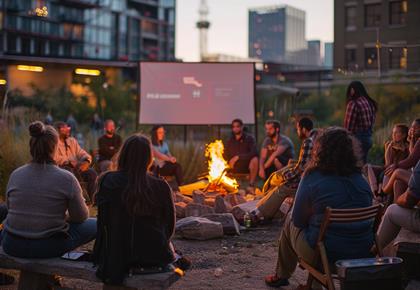The essence of leveraging community as your competitive advantage lies in the creation of a movement - a group of people united by shared values and goals.
This not only distinguishes you in a saturated market but also ensures your startup's resilience and relevance over time. Thus, prioritizing community building is not an optional strategy; it's essential for any startup aiming to leave a lasting mark.
Those who succeed in nurturing a community around their brand are the ones who truly stand out and thrive.
Why Community Matters
Think about the brands you love. Chances are, they don't just sell something you like; they stand for something you believe in. That's the power of community.It turns casual customers into loyal supporters who spread the word about your business. In today's digital age, where personal connections can sometimes feel lost, building a genuine community around your startup can make a big difference.
Imagine a SaaS startup that offers a project management tool designed for remote teams. To build a community, they launched an online forum where users can share tips, best practices, and success stories about managing distributed teams.
They also started a monthly webinar series featuring experts in remote work, offering advice and answering questions live. This strategy turned users into a community of remote work enthusiasts who not only relied on the tool for their daily tasks but also saw the forum and webinars as invaluable resources for improving their teams' efficiency and morale.
The community became a place where members could learn from each other, feel supported in their challenges, and celebrate their successes.
As a result, the startup saw increased user engagement, higher customer retention rates, and a significant boost in referrals.
The Benefits Are Real
Building a community doesn't just feel good; it has tangible benefits for your business. For starters, it can help you understand your customers better. By engaging with your community, you get real-time feedback on what's working and what's not. This can lead to improvements in your product or service and even spark ideas for new offerings.A strong community drives word-of-mouth marketing. People trust recommendations from friends and family more than any advertisement. When your users are excited about your startup, they'll tell others, and that's the kind of marketing money can't buy.
Airbnb
Take the story of Airbnb, a company that revolutionized the way we travel by tapping into the power of community. When Airbnb started, its founders focused on not just offering a platform for booking accommodations but also on creating a sense of belonging among hosts and travelers.
They encouraged hosts to share personal guides to their cities, and created features that made it easier for guests and hosts to connect and share experiences. This approach turned Airbnb from a simple service into a global community of travelers and hosts who share a love for adventure and local experiences.
The trust and relationships built through the platform have been key to Airbnb's success, making it more than just a place to book a stay. It became a way for people around the world to feel at home anywhere, thanks to the warmth and welcome of local communities.
How to Build Your Community
So, how do you start building this community? First, be clear about your values and what you stand for. Your community should be built around shared beliefs and goals.Next, engage with your audience. Use social media, forums, and events to talk to them, not at them. Listen to their feedback and show that you value their input.
Another key is to provide value beyond what you're selling. Whether it's helpful content, support groups, or exclusive events, give your community something that enriches their lives. This shows that you're invested in their well-being, not just their wallets.
Peleton
Look at how Peloton transformed the fitness industry by leveraging the power of community, especially through social media. Peloton isn't just selling exercise equipment; they're selling membership to an exclusive club of fitness enthusiasts.
By using platforms like Instagram and Facebook, Peloton has created a vibrant community where members can share their workout achievements, milestones, and personal stories of transformation. They regularly post motivational quotes, success stories from their users, and live workout sessions that make followers feel like they're part of a larger, supportive family.
This approach has turned their customers into brand ambassadors who proudly share their own content, wearing Peloton gear, and tagging the company in posts about their fitness journeys.
By sharing stories of their environmental efforts and featuring customers who live out these values, Patagonia has cultivated a loyal community of outdoor enthusiasts who are equally passionate about protecting the planet.
This community doesn't just buy Patagonia products; they advocate for the brand's mission, participate in environmental campaigns, and embody the ethos of responsible consumption.
The Long Game
Remember, building a community is a long-term investment. It won't happen overnight, but the effort you put in can pay off in spades. A strong community can support your startup through thick and thin, providing feedback, spreading the word, and even standing up for you in tough times.Harley-Davidson
Harley-Davidson is a classic example of a company that has mastered the art of building a community for the long haul. This iconic motorcycle brand has cultivated a fiercely loyal following by centering its identity around the spirit of freedom and rebellion.
Harley-Davidson doesn't just sell motorcycles; they sell membership to an exclusive club of enthusiasts who share a deep passion for the open road.
They've done this through organizing massive rallies, supporting local Harley owners' groups, and creating spaces where riders can share stories and experiences.
This community-building strategy has transformed customers into lifelong fans who wear the brand like a badge of honor. Even in tough times, the Harley-Davidson community stands strong, supporting the brand through thick and thin.
The company's success in building a dedicated community has not only helped them weather market fluctuations but also cemented their status as a cultural icon.

Most GTM strategies fail because they’re generic and boring. The secret to a killer go-to-market strategy? Pick an enemy. Rally your audience against inefficiency, high prices, or boring competitors. Build a brand that fights for something.

Growing a business in a niche market is a different game. Partnerships, focus, and authenticity are key. Here’s how to do it right

Technology or human touch? Many startups lose their magic with customers as they grow.Learn the secrets to scaling without losing their loyalty.
![Top 10 Client Objections and How to Handle Them [2024 Edition]](/images/blog/top-10-client-objections-and-how-to-handle-them.jpg)
Facing client objections can be frustrating, but they are a natural part of any business interaction. Instead of seeing them as roadblocks, view them as opportunities to better understand your clients and improve your approach.

Ever wondered how a story can turn an unknown gadget into a must-have? 🤔 Discover the art of storytelling in marketing unconventional products!

Absolutely vital for any business looking to get better: Closing the customer feedback loop. 🎯 Discover the 7 key steps top companies like Apple, Amazon, and Google use to effectively harness customer insights!

